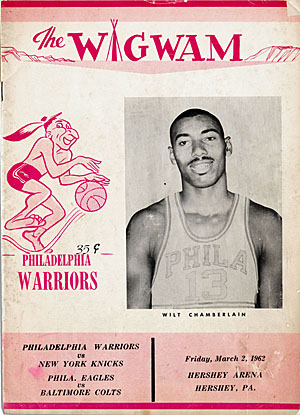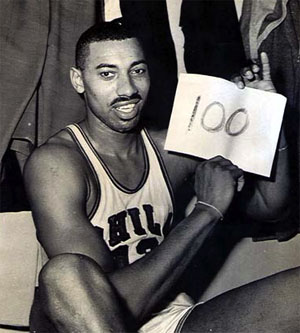Virginia @ William & Mary - 2/14/1953
A record that may never be broken was set on Valentine's Day 1953.
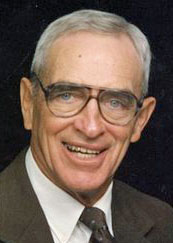
Boydson Baird
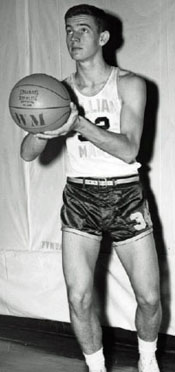
Bill Chambers
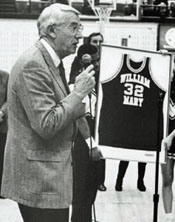
Chambers being inducted into W&M Hall of Fame
|
When William & Mary hosted Virginia in a Southern Conference game February 14, 1953, in Blow Gymnasium, little did anyone know that NCAA history would be made.
- Both teams were enduring mediocre seasons.
- The Cavaliers of Evan J. Male brought an 8-8 record to Williamsburg.
- First year coach Boydson Baird's Indians were just 7-9.
Neither team excelled at defense.
- In an era when scores in the 50s and 60s were typical, William & Mary had given up 80 or more points six times, including a 101-100 loss to West Virginia (in OT) and a 101-71 thumping by North Carolina State.
- The Cavaliers had surrendered over 80 points seven times, including a 100-79 by Gettysburg. But UVa had topped the 100 mark twice themselves (101-61 over Hampden-Sydney and 108-95 vs Virginia Tech).
- When the Indians had played at Virginia December 13, W&M prevailed 87-71.
Both teams would easily top their points totals from that contest.
- The visitors were never in the game as the Indians raced to a 19-4 lead.
- William & Mary blistered the nets for 62 points - in the first half! Virginia's 48 would have been respectable for a full game in those days.
- The Cavs closed the gap to 11 in the early stages of the third period when G Buzz Wilkinson and his running mate, Jake Dohner, started hitting with regularity.
- But that's as close as UVa would come as the Tribe extended their lead again and coasted home 105-84.
- The 105 points constituted a new all-time scoring record for William & Mary.
What makes the game memorable is the performance of William & Mary's 6'4" senior center, Bill Chambers.
- "Using a beautiful jumping twist shot and showing a deft touch around the boards," Chambers came close to the Blow Gymnasium individual scoring mark of 45 points set five years earlier by Chet Giermak against Towson State Teachers College.
- Bill might have bettered that mark except that Coach Baird removed him from the fray when W&M reached the century mark. So Chambers had to be content with 37 points on 16 baskets in 19 shots and five FTs.
But that wasn't the most remarkable aspect of his performance that night.
- Chambers corraled an astounding 51 rebounds.
- The NCAA certified that feat as a new record, obliterating the old mark of 36 by Herb Neff of Tennessee against Georgia Tech a little over a year earlier - January 26, 1952.
- Bill's record still stands to this day. The closest anyone has come is 43 rebounds by Charlie Stack of Marshall against Morris Harvey eleven months later (January 12, 1954).
- Tom Heinsohn of Holy Cross (and of Celtics fame later) snared 42 against Boston College March 1, 1955.
Years later, Chambers recalled his record-setting evening.
It wasn't a big deal at the time. When the game was over, nothing was said. It wasn't until later in the school year after the season was over that I found out I had the record.
Chambers averaged 21.8 rebounds per game but, thanks to the breakneck pace of the game, surpassed that figure by halftime.
- The scorekeeper had been aware that someting exciting was happening as the Indians went to the locker room at halftime. F Jerry Harris recalled: He told us, "You know Chambers has 26 rebounds already?" So we were aware of it after the first half. It was in the back of our mind, but it wasn't the object of the game.
- Still, the PA announcer made no comment about the record in the second half because no one knew what the record was. The Internet was decades in the future.
|
Harris, who was an inch taller than Chambers, recalled that Bill's fingers extended five inches above his when the two stood back-to-back with their arms extended over their heads.
- Another teammate, John Mahoney, recalled that Bill could stand flat-footed under the basket, leap up, and dunk the ball - a rare feet at the time for someone 6'4".
- Mahoney: They say "white man can't jump"? He could jump. He had a nose for the ball and great leaping ability. Everything that came off those boards, he gobbled up.
- Chambers: I had a built-in radar in my head so that when the ball left a player's hands, I could tell whether it was going to be short or long, bounce this way or bounce that way. I guess I had a little bit of a gift.
Chambers also averaged 20.2 points per game to earn a spot on the Helms All-American team.
- The Minneapolis Lakers selected him as their 11th pick in the 1953 NBA Draft.
- But he was cut by the Lakers during preseason.
After several successful years as a high school coach, Bill returned to his alma mater as head coach.
- The Indians achieved a winning record in six of his nine seasons.
- He compiled a 113-110 record, which stood as the most wins by any W&M coach until surpassed by Tony Shaver in 2013.
- The biggest win of Bill's career was a 94-86 victory in 1960 over #4 West Virginia, which broke the Mountaineers' 56-game Southern Conference winning streak.
- Chambers has been inducted into the William & Mary Hall of Fame as well as the Virginia Sports Hall of Fame.
Warriors vs Knicks - 3/2/1962 Wilt the Stilt did the unimaginable in little ol' Hershey PA.
Wilt Chamberlain spent Thursday, March 1, 1962, an off day in the grueling NBA schedule, in New York.
- Even though he played for the Philadelphia Warriors, Wilt lived in an apartment in New York City.
- He stayed up all night because, in his words from his autobiography, I'd been kept busy by an "encounter" or two (or three). He boarded a mid-morning train to Philadelphia to join his team for the game the next night in Hershey PA. I couldn't sleep on the train because I was scared I'd wake up somewhere in Virginia, Wilt recalled.
- Arriving in the City of Brotherly Love, he joined his teammates for the bus ride to Hershey, "The Sweetest Place on Earth," 95 miles NW of Philly.
- It would be the third and final home game that the Warriors would play in the city known for its chocolate bars. It was common in those days when the NBA ran a distant 3rd in the pro sports pecking order for teams to play games in nearby cities to broaden their fan base.
- Wilt spent the hours before the game in the game arcade inside the Hershey Sports Arena playing the rifle game. As he recalled, I completely destroyed all existing shooting records there - an omen of things to come.
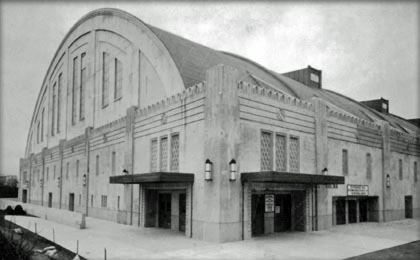
Hershey Sports Arena
|
|
In another attempt to draw fans, the 76ers held a preliminary game between a team composed of football players from the Philadelphia Eagles against a team of Baltimore Colts.
- About 9:30, the Warriors took the court against the Knicks in the fifth-to-last game of the regular season.
- Nine games behind the first-place Celtics and 8 ahead of the 3rd place Syracuse Nationals, the Warriors were playing out the string before entering the playoffs as the 2nd seed in the Eastern Division.
- The Knicks, meanwhile, had secured the cellar, 27 games behind Boston. No members of the New York press accompanied the team to the game.
4,124 fans attended in an arena that held 7,200, still a good crowd by the standards of the day.
- As usual when teams are wrapping up a long season, neither team played much defense.
- The Warriors jumped out 19-3 and led 42-26 at the end of Q1. At that point, the only working photographer left.
- Wilt scored 22 in the opening period. The lifetime 51.1% FT shooter who tried all manner of ways to shoot freebies recalled, I wasn't thinking about getting a lot of points, but after I made nine straight free throws, I was thinking about a foul-shooting record.
- By halftime, Chamberlain had 41 points, and the Warriors led 79-68. He seemed to be on his way to scoring even more than he had in any of the three previous games when he canned 67, 65, and 61.
- Teammate Paul Arizin had an idea of why Wilt wanted to score so many points that night. Wilt always liked to wear rubber bands on his wrist. Earlier in the year, when we were playing in the Garden, New York came out with all their players wearing rubber bands on their wrists. That may have annoyed Wilt, being an attempt to embarrass him. Another thing was Darrall Imhoff, the Knicks center, had been an All-American the previous year for California. Darrall's reputation was as a defensive player, and Wilt especially liked to show defensive players what he could do.
|
Chamberlain continued his onslaught in the second half.
- He scored 28 in Q3 for a total of 69. That gave him a great shot at breaking his personal records of 73 points in regulation and 78 points in a triple OT game. At that point, an off-duty Associated Press photographer in attendance named Paul Vathis realized that history was being made and went to his car and got his camera.
- After he put in the 78 against the Lakers in December, 1961, Warriors coach Frank McGuire predicted Wilt would score 100 some night.
- He continued his hot foul shooting, sinking 28 of 32 for the evening.
- Warriors statistician Harvey Pollack got the PA announcer to tell the audience how many points Wilt had after every basket. Late in the game, the crowd starting chanting the points with the PA man.
- With 10:25 left, Chamberlain tied his personal record, and league mark, of 73 points in regulation time. Within 30 seconds he had 75.
- The game was not televised and no video of it exists, but someone made a recording of Bill Campbell's radio broadcast of the game. He observed that Wilt's teammates on the bench were jumping for joy each time he scored a basket.
- With eight minutes to go, Wilt sank a fadeaway jump shot to give him 79, a new record for points in an NBA game.
- When he reached 84 points, Campbell told his audience, If you know anybody not listening, call them up. A little history you're sitting in on tonight.
- G Al Attles fed Wilt on a 3-on-1 break for a stuff and 89 points with three and a half minutes to go. The fans in the arena were going crazy, shouting We want a hundred.
- The Knicks had started milking the 24-second shot clock, determined to avoid the embarrassment of allowing someone to score 100 points on them. They also tried to foul the Warriors in the backcourt to prevent them from getting the ball to Wilt.
- McGuire sent in reserves with instructions to foul the Knicks early in their shot clock so the Warriors could get the ball more times.
- With 2:28 on the clock, Wilt hit a fadeaway jumper for points 91 and 92. Sixteen seconds later, he had 94. 96 came on another of his patented fadeaway jumpers. A dunk produced 98 with 1:19.
- Ted Luckenbill, one of McGuire's designated foulers, sent Knicks' G Richie Guerin to the foul line, where he made both FTs.
- Jim Heffernan of the Philadelphia Bulletin described what happened next. The fans were on their feet and screaming. The players on the Warriors bench squirmed. The tension was at its peak. Wilt intercepted the ensuing throw-in by the Knicks and missed a shot from the foul line. And after the Knicks missed, the Warriors came down court and Wilt moved into the pivot, surrounded by New Yorkers. Ruklick fed the Big Dipper a pass. Wilt missed. He grabbed the rebound and missed again. Luckenbill snared the ball and passed the ball to Ruklick. Joe spotted Wilt under the basket, and lobbed ball toward the hoop. Chamberlain grabbed it with both hands and stuffed it through.
- On radio, Campbell exulted. He made it! A Dipper dunk! He made it. The fans are all over the floor. They stop the game. People are running out on the court. One hundred points for Wilt Chamberlain. They stop the game. People are crowding him, pounding him, pounding him. The Warrior players are all over him. Fans are coming out of the stands. Forty-six seconds are left. The most amazing scoring performance of all time. One hundred points by the Big Dipper.
- One of the officials brought the ball that went into the net for 100 to Pollack at the scorer's table. He in turn gave it to the equipment manager, who put it in a duffel bag in Wilt's locker.
- When the court was cleared, the final 46 seconds were played with Wilt standing at center court, not participating. He didn't want to score 101 or 102.
- Final score: Warriors 169 Knicks 147
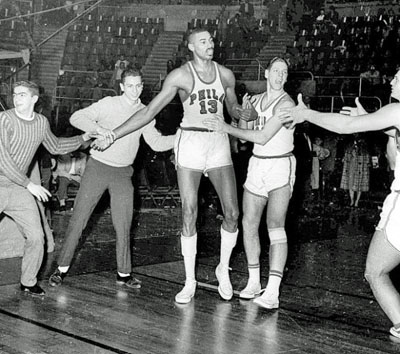
Fans and teammates congratulate Wilt after his 100th point. Chamberlain set numerous records that evening, all of which still stand except most points in a quarter.
- Most points in a game - 100
- Most FGs in a game - 36
- Most FGs in a half - 22
- Most shots taken - 63
- Most points in a quarter - 31
- Most points in a half - 59
- Most foul shots made - 28
|
|
After the game, Wilt thanked his teammates for helping him.
- It would have been impossible to score that many if they hadn't kept feeding me.
- Pollack asked photographer Vathis if he had gotten some shots. Yes, was the reply, but nothing that really shows what Wilt did. So Harvey tore off a sheet of paper, scrawled "100" on it, and gave it to Wilt who held it in front of him for one of the most famous photographs in basketball history.
- Attles, known more for his defensive ability than for offensive prowess, made 8-of-8 from the field that night and 1-for-1 from the foul line. He kidded Wilt, Big Fella, I'll have a mental block for the rest of my life. I don't miss a shot, and nobody even talks to me.
- The other G, Guy Rodgers, had 20 assists. There wasn't an easier way in the world to get assists tonight. All I had to do was give the ball to the Dipper.
- In the other locker room, Knicks coach Eddie Donovan didn't appreciate what Chamberlain had done. The game became a farce. They would foul us, and we would foul them.
|
Since the Warriors' next game was the following Sunday in New York, Wilt received permission to ride back to the Big Apple with several members of the Knicks.
- Wilt dozed on and off in the passenger seat throughout the three-hour trip.
- While awake, he heard the driver, his good friend Willie Naulls, and the two Knicks in the back seat talking about the game. Can you believe that SOB scored a hundred points against us? They'd talk about all the tactics they used to try to keep him from scoring. Then they'd repeat, A hundred points!
- When they dropped him off at his apartment near Central Park, Wilt told them, You guys are sure nice to this SOB. Letting me score a hundred points, then giving me a ride all the way back to my apartment. Thanks, fellows.
- Imhoff bragged that he "held" Wilt to 58 points in the Sunday game.
- Chamberlain finished the season with a 50.4 ppg average - another record that still stands. But Wilt said, It doesn't mean a thing if we don't win the title.
- The '62 Warriors defeated Syracuse in the best-of-five first round series before bowing to the Celtics in seven games in the Eastern finals.
A final note: Not only has no one scored 100 points in a game, no two players on the same team have ever scored 100 points between them. (No, not even when Kobe Bryant canned 81 in 2006. His highest teammate had 13.)
When Wilt died of a heart attack at age 63 in 1999, the Paul Vathis photo of him holding the "100" sheet stood on the church dais at Chamberlain's memorial service.
|
References: Wilt: Larger Than Life, the Definitive Wilt Chamberlain Biography, Robert Cherry (2004)
Wilt Chamberlain: A View from Above, Wilt Chamberlain (1992)
Indiana- Kentucky 12/7/1985 Follow Bobby Knight as he coaches a stressful game.
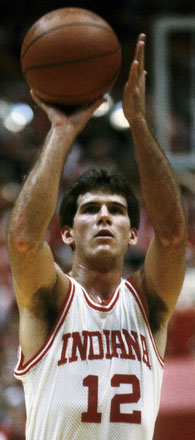
Steve Alford
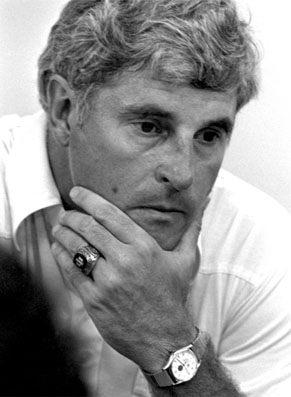
Bob Knight
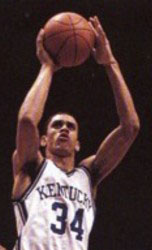
Kenny Walker
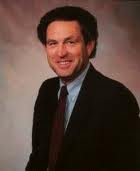
Eddie Sutton
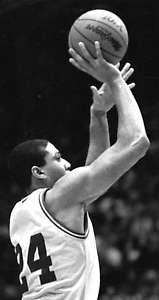
Daryl Thomas
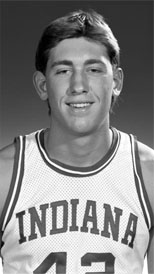
Todd Jadlow
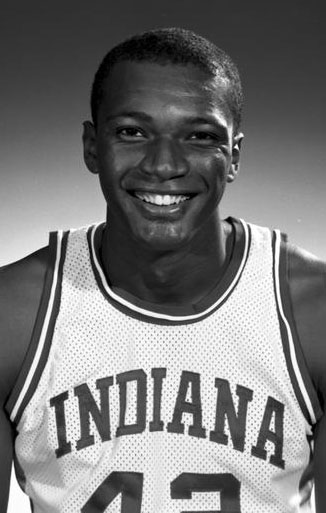
Rick Calloway
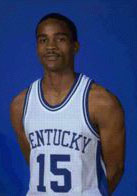
Ed Davender
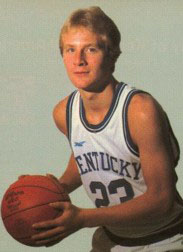
Roger Harden
|
It all started so innocently.
- A group of sorority girls asked Indiana junior G Steve Alford to pose for a calendar they were putting together to raise money for a camp for handicapped girls.
- The photo shoot took all of ten minutes. He wore a sport coat and slacks and received no money.
- When the calendar came out, the athletic department's promotions director blanched when he saw Mr. February. Alford had broken an NCAA rule prohibiting scholarship athletes from posing for any picture or film made by anyone outside their athletic department.
The timing could hardly have been worse.
- Fresh off an 82-67 trouncing of Notre Dame in which Alford canned 32, Bobby Knight's 2-0 Hoosiers, ranked #19, were preparing for their trip to Lexington in two days to play #9 Kentucky, already 4-0.
- The AD called the NCAA office to report the violation. Given the clean record of the Hoosiers under Knight's leadership, there was every reason to expect that the school would get off with a warning and Alford wouldn't have to miss a game.
- That's what happened at Ohio State two years earlier when QB Mike Tomczak posed in a magazine ad for a local clothing store. He also hadn't received any money. So the NCAA issued only a letter of reprimand.
- However, NCAA rules allowed as much as a three-game suspension for Alford's violation. After initially saying Indiana should be alright, an official for the infractions committee called back to say that Steve would be suspended for one game. When asked why Ohio State hadn't suffered the same fate, the official replied, The rule wasn't as widely publicized back then. Now, everyone knows it.
- Indiana could appeal, which would allow Alford to play against the Wildcats. But if the committee met formally to hear the appeal, it could impose the maximum three-game suspension.
- Knight and his AD decided to sit Alford for the game in Lexington rather than lose him for the first few games of Big Ten play starting with the opener against Michigan.
It took far less than this to enrage Knight.
- His favorite player had been careless in not checking with the athletic department before posing for the picture. He said the sorority girls said they'd check but didn't. Knight told him, Their eligibility wasn't at stake, Steve. Yours was. You should have checked it out yourself.
- The coach decided to not even take Alford on the trip to Lexington. Knight told former star G Quinn Buckner, a member of the Indiana Pacers who called to lend support, I'm not even going to take the little sonofabitch on the trip. Screw him.
- What galled Bobby even more, in addition to his alma mater getting off without a suspension for the same offense two years earlier, was losing Alford for the game against Kentucky, of all schools.
- In late October, The Lexington Herald-Leader had published a series of stories detailing a protracted period of payoffs to UK players during the 13-year coaching tenure of Joe B. Hall that just ended.
- Knight felt the NCAA was dragging its feet in investigating the allegations, giving the excuse that none of the 26 ex-players mentioned in the series repeated their stories on the record.
- For Alford not to play when all their kids are playing kills me, Bobby said privately. There are kids on that team right now who have gotten more crap from alumni than any players in the country. I supposed [star forward] Kenny Walker's never gotten anything. Anyone who believes that is either stupid or blind.
- Another factor underlying Knight's frustration was the fact that he was coming off a 19-14 season at the end of which the Hoosiers had to settle for an NIT invitation. (They lost to UCLA in the finals.)
Although Bobby thought Indiana could still win if his players held together and played smart, he nearly changed his mind about sitting Alford.
- His edginess came through the morning of the game when he participated in the obligatory interview by the other team's announcer, in this case the legendary Cawood Ledford.
- Cawood innocently asked Knight about the IU-UK rivalry, These games are special, aren't they? Bobby couldn't resist: You know, Cawood, with all the crap that has gone on down here over the years with recruiting and all, these games are not nearly as special to me as you might think.
- Many Big Blue fans would hear the interview on the pregame show and direct their ire toward Knight and his boys even more virulently than usual.
- After the interview, Bobby told writer John Feinstein, who was writing a book about Indiana's season: It's just not right for Steve not to play in this game. I've got a mind to have him fly down here and play him. There's no way the NCAA will suspend him for more than one game. Public opinion would bury them if they did.
- As he did frequently when he felt the need for advice, Knight called former coach Pete Newell. I might just say screw the NCAA. How can Steve not play and Walker can play? That just isn't right and you know it.
- But Newell talked him out of changing the plan, which was well thought out as opposed to his current emotional reaction. Don't take the chance that the NCAA won't behave logically.
Knight was surprised when two SEC officials and one Big Ten ref walked onto the court before the game.
- He had told Kentucky coach Eddie Sutton in the spring to get neutral officials.
- Knight hated "split crews" to begin with, and the Big Ten official, Tom Rucker, was one of Bobby's least favorite, which is saying something given his low opinion of referees in general.
Even without Alford, the game lived up to its billing as an early season test.
- The screaming crowd of 24,000 didn't bother the Hoosiers, who took care of the two challenges the coaches had worked on: handling the Wildcat press and rebounding.
- Kentucky pulled out to a seven-point lead in the first half, but the visitors pulled into a 32-32 tie at halftime.
- Knight to his team during the break: You have now made this a twenty-minute basketball game. But you have to play smarter to win the game. We are still making mistakes on defense. Play hard and smart. You tell me now that we aren't capable of playing with anybody. Don't mope, don't feel sorry, don't feel hurt. Feel like, "Goddammit, we're gonna win a basketball game." The easy twenty minutes is over. This is the hard twenty minutes. Don't let the effort you've made go down the drain with sloppy effort early. Let's be smart and get it down to the last three minutes where we can win the game with our guts and our hearts. Don't go out there now thinking you're ready to play. Go out there knowing you're ready.
Neither team could shake the other through the first part of the second half.
- Each time UK took a lead, the Hoosiers answered.
- Daryl Thomas, whom Knight had reduced to tears during preseason practices, and Todd Jadlow did a good job on Walker inside, causing Kenny and his coach to complain to the officials about what Sutton afterwards called thuggery in the pivot.
- IU freshman Rick Calloway made a layup to tie the game for the tenth time 42-42.
- During the timeout called by Kentucky, Knight returned to the theme of his halftime talk: Twelve minutes. You've taken it from a forty-minute game to a twelve-minute game. Hang with it now, don't make mistakes, and we'll be fine.
But with their best outside shooter back in Bloomington, IU had to work for every basket, and that effort takes a toll on you.
- When play resumed, Kentucky reeled off nine straight points to lead 51-42, forcing Knight to call time.
- Trying to be heard over the din, he told his huddle: Just be patient. There's lots of time. Don't get rattled. There is nothing to be rattled about.
- The Hoosiers fought back. Captain Stew Robinson did a reasonable Alford imitation with an outside shot as IU cut the deficit to 57-54 with 2:20 on the clock.
- The crowd began to get nervous. Surely their Men in Blue wouldn't lose at home to an IU team without Alford.
With UK leading 59-56 with 1:30 left, Rucker had to make a crucial call.
- Kentucky G Ed Davender, who would lead all scorers with 22, penetrated looking to pass to Walker. But Andre Harris knocked the ball loose, and Robinson came up with it.
- Stew and Harris raced downcourt on a 2-on-1 against G Roger Harden. As they neared the goal, Robinson decided not to pass and go straight up for a layup.
- Harden turned to face downcourt and planted his feet to take the charge as the offensive player soared and put the ball into the basket. Both players fell in a heap.
- The nearest official, Rucker, blew his whistle immediately. As he stopped running under the goal, he came back in bounds to make his call as 24,000 held their breath. Charging or blocking? 59-58 UK with Indiana shooting a FT to tie or Wildcat ball still leading by 3?
- Rucker put his hand behind his head and pointed toward Kentucky's basket - charging.
- Knight, hands on hips, just stared at Rucker who had ruled in favor of the team with 24,000 fans in the building and against a man he didn't like.
- The game tape would show that the call was wrong, that Harden was still moving when Robinson contacted him.
- Knight especially hated the fact that Harden had fooled the official. Not only did Roger leave the Hoosier state to play for UK but earlier in the week guaranteed a Kentucky victory.
The Wildcats held on for the hard-earned win.
- After running the clock down, Harden drove along the baseline for a clinching layup with 30 seconds left.
- The final score was 63-58 - close enough to make Hoosier fans claim that Alford would have made the difference.
Knight hated all losses, but especially this one, as he told his team in the locker room.
The problem is you aren't hurt enough. You're sitting here satisfied because you played a good game. All I want to do is go into a room somewhere and cry. I could just cry. Boys, there's no such thing as a moral victory. The game was there to win and we lost. If you just followed the rules, we would have won. Instead, those cheating sons of bitches won.
On his way to the postgame press conference, Knight met Sutton in the hallway returning from his.
- Eddie came over to offer more congratulations on a good game.
- Knight: Eddie, didn't I ask you to get neutral officials when we talked last spring?
- Sutton: I don't remember, Bobby. I suppose you might have. I don't pay much attention to that sort of thing.
- Knight: Well I do. And I wanted neutral officials.
- Sutton: If you wanted neutral officials, Bob, why didn't you get 'em yourself?
- Knight: You were the home team, Eddie. That means you get the officials. And when I ask you to get neutral officials and you agree, I think I have every right to think I'll get neutral officials.
Knight's press conference didn't last long.
- He had told the players to deflect any questions about Alford.
- When the inevitable question came, Bobby replied, I would like to think that the NCAA would have given some consideration to our past record. A rule was broken. They have to live with what they did. But I accept responsibility. We didn't have a good enough checking system.
When the Hoosiers returned to campus, Knight said, It bothers me that Alford's not here to see his teammates. That disappoints me.
- As usual, the staff reviewed the tapes of the game.
- They finally went home at 4 am to get some sleep before practice at 11 am.
Postscript
- The 1985-6 Indiana Hoosiers finished 21-8, 13-5 in the Big Ten before being ousted in the first round of the NCAA tournament by Cleveland State.
- The Wildcats had a great season, winning 32 and losing 4 but the last defeat came at the hands of LSU in the Southeast Regional final, 59-57, after UK had defeated the Tigers three times earlier in the season.
|
|
|




